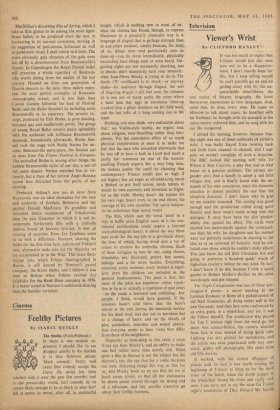Cinema
Feelthy Pictures
By ISABEL QUIGLY
The Snobs. (Paris-Pullman.) laughs, which is nothing new to most of us: what the cinema has found, though, to express blackness in a peculiarly cinematic way is a language of disgust that is perhaps stronger than in any,iother medium, simply because, for, most of us, things , seen—and particularly seen in close-up—can be more immediately, physically nauseating than things read or even heard. Dis- gusting sights are not necessarily shocking, just as shocks don't necessarily turn your stomach: what Jean-Pierre Mocky is trying to do in The Snobs ('X' certificate) is to shock—or anyway shake—his audience through disgust, the sort of lingering disgust I still feel aver, for instance (a is one out of many such), the scene where a bald man has eggs in enormous close-up cracked into a gluey shampoo on his bald head, and the last tufts of it keep coming out in the wash.
Nothing, you may think, very outlandish about that: no Vadim-style nudity, no orgies; and, about religion, nose-thumbing rather than blas- phemy. Yet the cumulative effect of so much physical repulsiveness at once is to make me feel that the man who remarked afterwards that he was off to have a bath in Lysol had made a pretty fair comment on one of the sourest- smelling French exports for a very long time. Its makers justify the smell by claiming that contemporary France smells just as high if not higher; but an anger as all-embracing needs a Minuet to put itself across, needs talents to match its own enormity and invention as fright- ful as the truth. Mocky hasn't the stature for his own rage, hasn't even, as the end shows, the courage of his own cynicism. For saeva indigna- hio he substitutes high moral vomit.
The film, which uses the word 'snob' in a way to baffle plain English users of it (its con- tinental ramifications could inspire a learned socio-philological essay), is about the way three men jostle for the top job in a provincial dairy, the boss of which, having dived into a vat of cream to retrieve his umbrella, drowns. Each of them intrigues as best he can, using charm, friendship, sex, blackmail, prayer, boy scouts, bishops and a' lot more besides. Everything, everyone, every moment, every instinct is repul- sive; even the children are included in the general loathsomeness. The pace is fast, but most of the jokes are repetitive—either repeti- tive in form or actually a repetition of past jokes —so the result is laboured and confusing: few people, I think, would have guessed, if the synopsis hadn't told them, that the hero's retreat at the end, during the memorial service for his dead rival, was due not to boredom but to a change of heart; and on the details of plot, symbolism, intention and sexual aberra- tion everyone seems to have views that differ from those of his neighbours.
Depravity as bone-deep as this takes a more X-ray eye than Mocky's, and an ability to make one feel rather more than merely sick. What, gives a film its flavour is not the subject but the director's eye, the eye that for a while becomes our own, distorting things this way or that for us; and Mocky lends us an eye that (to me at least) seems trivial, so that all the viciousness he shows seems viewed through the wrong end of a telescope, and tiny ant-like creatures go about their feel(hy business.


































 Previous page
Previous page